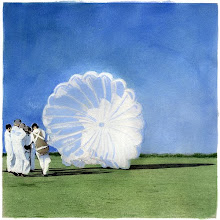Marlene succeeds in a man's world, the capitalistic world, but at the tremendous personal sacrifice of her humanity.
Joyce, who cleans houses for a living for herself and Angie, displays admirable personal strength and character, but at a great cost in economic security.
Angie's howl at the end signals not only her own fate as one who has neither character nor aggressive ability but also the fate of feminists, who see limitations no matter which road is taken.
人間性を犠牲にして男社会で成功するか、経済的安定を犠牲にしても人間として筋を通すか。最後のアンジーのうめきは、どちらを選んでも限界があることを知っていたフェミニストたちのうめきでもある。
Janet Brown, "Caryl Churchill's Top Girls Catches the Next Wave"より(Session 6)
...a feminist critique of Marlene, a contemporary woman executive.
Marlene has accepted the limited reform that makes her own success possible without recognizing the larger oppressions that continue even in her own family.
Thus the play is expressive of the next wave of feminism, a feminism that focuses not on the individual woman's struggle for autonomy, but on the need for a radical transformation of society.
The dream of the past reminds us not only of the historical weight of women's oppression but also of the futility of individual solutions.
The child's dream of the future reminds us of what is at stake in the feminist struggle for societal transformation.
女性重役への昇進を勝ち取ったマーレーンは、女性個人の成功を可能にした社会変革の成果を享受していた。しかし、家族であるジョイスやアンジーを囲む、更に大きな抑圧には気付きもしなかった。
マーレーンが謳歌する社会変革の成果は、実は限られたものであった。
フェミニズムの次の波―第二波―は、マーレーンの成功に表されるような個々の女性の自立に関する葛藤ではなく、個々の女性が葛藤してもどうしようもないような問題における、根本的な社会変革の必要性に重点を置いている。
